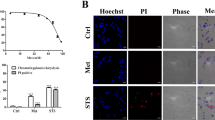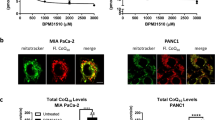Abstract
Drastic surges in intracellular reactive oxygen species (ROS) induce cell apoptosis, while most chemotherapy drugs lead to the accumulation of ROS. Here, we constructed an organic compound, arsenical Ar-(4-(1,3,2-dithiarsinan-2-yl)phenyl) acrylamide (AAZ2), which could prompt the ROS to trigger mitochondrial-dependent apoptosis in gastric cancer (GC). Mechanistically, by targeting pyruvate dehydrogenase kinase 1 (PDK1), AAZ2 caused metabolism alteration and the imbalance of redox homeostasis, followed by the inhibition of phosphoinositide-3-kinase (PI3K)/protein kinase B (AKT)/mammalian target of rapamycin (mTOR) pathway and leading to the activation of B-cell lymphoma 2 (Bcl2)/Bcl2-associated X (Bax)/ caspase-9 (Cas9)/Cas3 cascades. Importantly, our in vivo data demonstrated that AAZ2 could inhibit the growth of GC xenograft. Overall, our data suggested that AAZ2 could contribute to metabolic abnormalities, leading to mitochondrial-dependent apoptosis by targeting PDK1 in GC.
概要
大部分化疗药物可以促进活性氧(ROS)产生,同时ROS可以诱导细胞凋亡。本研究构建了一种有机砷化合物N-(4-(1,3,2-dithiarsinan-2-yl)phenyl)acrylamide(AAZ2),其可通过促进ROS产生诱导胃癌线粒体依赖的细胞凋亡。具体机制为AAZ2通过靶向丙酮酸脱氢酶激酶1(PDK1)导致葡萄糖代谢改变和氧化应激,继而抑制PI3K/AKT/mTOR通路,最终激活半胱天冬酶(caspase)依赖的细胞凋亡。此外,体内实验也证实了AAZ2可以抑制胃癌移植瘤的生长。综上,在胃癌中,AAZ2可以通过靶向PDK1影响葡萄糖代谢及随后的氧化应激反应,抑制PI3K/AKT/mTOR信号通路,最终诱发线粒体依赖的细胞凋亡。
Similar content being viewed by others
References
Anwar S, Shamsi A, Mohammad T, et al., 2021. Targeting pyruvate dehydrogenase kinase signaling in the development of effective cancer therapy. Biochim Biophys Acta Rev Cancer, 1876(1): 188568. https://doi.org/10.1016/j.bbcan.2021.188568
Cui QB, Wang JQ, Assaraf YG, et al., 2018. Modulating ROS to overcome multidrug resistance in cancer. Drug Resist Updat, 41:1–25. https://doi.org/10.1016/j.drup.2018.11.001
D’Souza LC, Mishra S, Chakraborty A, et al., 2020. Oxidative stress and cancer development: are noncoding RNAs the missing links? Antioxid Redox Signal, 33(17):1209–1229. https://doi.org/10.1089/ars.2019.7987
Elliott MA, Ford SJ, Prasad E, et al., 2012. Pharmaceutical development of the novel arsenical based cancer therapeutic GSAO for Phase I clinical trial. Int J Pharm, 426(1–2): 67–75. https://doi.org/10.1016/j.ijpharm.2012.01.024
Fattahi S, Amjadi-Moheb F, Tabaripour R, et al., 2020. PI3K/ AKT/mTOR signaling in gastric cancer: epigenetics and beyond. Life Sci, 262:118513. https://doi.org/10.1016/j.lfs.2020.118513
García-Guerrero E, Götz R, Doose S, et al., 2021. Upregulation of CD38 expression on multiple myeloma cells by novel HDAC6 inhibitors is a class effect and augments the efficacy of daratumumab. Leukemia, 35:201–214. https://doi.org/10.1038/s41375-020-0840-y
Gu HF, Huang TH, Shen YC, et al., 2018. Reactive oxygen species-mediated tumor microenvironment transformation: the mechanism of radioresistant gastric cancer. Oxid Med Cell Longev, 2018:5801209. https://doi.org/10.1155/2018/5801209
Harris IS, DeNicola GM, 2020. The complex interplay between antioxidants and ROS in cancer. Trends Cell Biol, 30(6): 440–451. https://doi.org/10.1016/j.tcb.2020.03.002
Hayes JD, Dinkova-Kostova AT, Tew KD, 2020. Oxidative stress in cancer. Cancer Cell, 38(2):167–197. https://doi.org/10.1016/j.ccell.2020.06.001
Jin L, Kim EY, Chung TW, et al., 2020. Hemistepsin A suppresses colorectal cancer growth through inhibiting pyruvate dehydrogenase kinase activity. Sci Rep, 10:21940. https://doi.org/10.1038/s41598-020-79019-1
Joshi SS, Badgwell BD, 2021. Current treatment and recent progress in gastric cancer. CA Cancer J Clin, 71(3):264–279. https://doi.org/10.3322/caac.21657
Lin JX, Xie XS, Weng XF, et al., 2019. UFM1 suppresses invasive activities of gastric cancer cells by attenuating the expression of PDK1 through PI3K/AKT signaling. J Exp Clin Cancer Res, 38:410. https://doi.org/10.1186/s13046-019-1416-4
Missiroli S, Perrone M, Genovese I, et al., 2020. Cancer metabolism and mitochondria: finding novel mechanisms to fight tumours. eBioMedicine, 59:102943. https://doi.org/10.1016/j.ebiom.2020.102943
Nerreter T, Letschert S, Götz R, et al., 2019. Super-resolution microscopy reveals ultra-low CD19 expression on myeloma cells that triggers elimination by CD19 CAR-T. Nat Commun, 10:3137. https://doi.org/10.1038/s41467-019-10948-w
Pai S, Yadav VK, Kuo KT, et al., 2021. PDK1 inhibitor BX795 improves cisplatin and radio-efficacy in oral squamous cell carcinoma by downregulating the PDK1/CD47/Aktmediated glycolysis signaling pathway. Int J Mol Sci, 22(21):11492. https://doi.org/10.3390/ijms222111492
Perillo B, di Donato M, Pezone A, et al., 2020. ROS in cancer therapy: the bright side of the moon. Exp Mol Med, 52(2): 192–203. https://doi.org/10.1038/s12276-020-0384-2
Sanz MA, Fenaux P, Tallman MS, et al., 2019. Management of acute promyelocytic leukemia: updated recommendations from an expert panel of the European LeukemiaNet. Blood, 133(15):1630–1643. https://doi.org/10.1182/blood-2019-01-894980
Škorja Milić N, Dolinar K, Miš K, et al., 2021. Suppression of pyruvate dehydrogenase kinase by dichloroacetate in cancer and skeletal muscle cells is isoform specific and partially independent of HIF-1α. Int J Mol Sci, 22(16): 8610. https://doi.org/10.3390/ijms22168610
Smyth EC, Nilsson M, Grabsch HI, et al., 2020. Gastric cancer. Lancet, 396(10251):635–648. https://doi.org/10.1016/s0140-6736(20)31288-5
Sradhanjali S, Tripathy D, Rath S, et al., 2017. Overexpression of pyruvate dehydrogenase kinase 1 in retinoblastoma: a potential therapeutic opportunity for targeting vitreous seeds and hypoxic regions. PLoS ONE, 12(5):e0177744. https://doi.org/10.1371/journal.pone.0177744
Schneider CA, Rasband WS, Eliceiri KW, 2012. NIH Image to ImageJ: 25 years of image analysis. Nat Methods, 9(7): 671–675. https://doi.org/10.1038/nmeth.2089
Shang MT, Zhou ZW, Kuang WB, et al., 2021. High-precision 3D drift correction with differential phase contrast images. Opt Express, 29(21):34641–34655. https://doi.org/10.1364/OE.438160
Tataranni T, Piccoli C, 2019. Dichloroacetate (DCA) and cancer: an overview towards clinical applications. Oxid Med Cell Longev, 2019:8201079. https://doi.org/10.1155/2019/8201079
Tewari D, Patni P, Bishayee A, et al., 2022. Natural products targeting the PI3K-Akt-mTOR signaling pathway in cancer: a novel therapeutic strategy. Semin Cancer Biol, 80:1–17. https://doi.org/10.1016/j.semcancer.2019.12.008
Velpula KK, Bhasin A, Asuthkar S, et al., 2013. Combined targeting of PDK1 and EGFR triggers regression of glioblastoma by reversing the Warburg effect. Cancer Res, 73(24): 7277–7289. https://doi.org/10.1158/0008-5472.can-13-1868
Wadgaonkar P, Chen F, 2021. Connections between endoplasmic reticulum stress-associated unfolded protein response, mitochondria, and autophagy in arsenic-induced carcinogenesis. Semin Cancer Biol, 76:258–266. https://doi.org/10.1016/j.semcancer.2021.04.004
Wang P, Jin JM, Liang XH, et al., 2022. Helichrysetin inhibits gastric cancer growth by targeting c-Myc/PDHK1 axis-mediated energy metabolism reprogramming. Acta Pharmacol Sin, 43(6):1581–1593. https://doi.org/10.1038/s41401-021-00750-0
Wang QQ, Jiang Y, Naranmandura H, 2020. Therapeutic strategy of arsenic trioxide in the fight against cancers and other diseases. Metallomics, 12(3):326–336. https://doi.org/10.1039/c9mt00308h
Wang WP, Dong XX, Liu Y, et al., 2020. Itraconazole exerts anti-liver cancer potential through the Wnt, PI3K/AKT/ mTOR, and ROS pathways. Biomed Pharmacother, 131: 110661. https://doi.org/10.1016/j.biopha.2020.110661
Weng MS, Chang JH, Hung WY, et al., 2018. The interplay of reactive oxygen species and the epidermal growth factor receptor in tumor progression and drug resistance. J Exp Clin Cancer Res, 37:61. https://doi.org/10.1186/s13046-018-0728-0
Wu J, Henderson C, Feun L, et al., 2010. Phase II study of darinaparsin in patients with advanced hepatocellular carcinoma. Invest New Drugs, 28(5):670–676. https://doi.org/10.1007/s10637-009-9286-9
Xu XH, Wang HB, Li HY, et al., 2019. S-Dimethylarsinoglutathione (darinaparsin®) targets histone H3.3, leading to TRAIL-induced apoptosis in leukemia cells. Chem Commun, 55(87):13120–13123. https://doi.org/10.1039/c9cc07605k
Acknowledgments
This study was supported by the Wuhan University Zhongnan Hospital Translational Medicine and Interdisciplinary Research Joint Fund (No. ZNJC201910), China.
Author information
Authors and Affiliations
Corresponding authors
Additional information
Author contributions
Study design: Yi LI and Wenyan SHE; Data collection: Yi LI, Wenyan SHE, Xiaoran XU, Yixin LIU, Sheng TIAN, and Shiyi LI; Data analysis: Yi LI, Yixin LIU, and Xinyu WANG; Data interpretation: Yi LI, Wenyan SHE, Xinyu WANG, and Miao WANG; Writing of manuscript: Yi LI; Critical revision: Yi LI, Chaochao YU, and Pan LIU; Final approval: Yi LI, Yongchang WEI, and Tianhe HUANG; Overall supervision: Tianhe HUANG and Yongchang WEI. All authors have read and approved the final manuscript, and therefore, have full access to all the data in the study and take responsibility for the integrity and security of the data.
Compliance with ethics guidelines
Yi LI, Wenyan SHE, Xiaoran XU, Yixin LIU, Xinyu WANG, Sheng TIAN, Shiyi LI, Miao WANG, Chaochao YU, Pan LIU, Tianhe HUANG, and Yongchang WEI declare that they have no conflict of interest.
The study was approved by the Medical Ethics Committee Zhongnan Hospital of Wuhan University (No. ZN2021006) and performed in accordance with the Declaration of Helsinki.
Supplementary information
Table S1; Figs. S1 and S2
Supplementary information
Rights and permissions
About this article
Cite this article
Li, Y., She, W., Xu, X. et al. AAZ2 induces mitochondrial-dependent apoptosis by targeting PDK1 in gastric cancer. J. Zhejiang Univ. Sci. B 24, 232–247 (2023). https://doi.org/10.1631/jzus.B2200351
Received:
Accepted:
Published:
Issue Date:
DOI: https://doi.org/10.1631/jzus.B2200351
Key words
- N-(4-(1,3,2-dithiarsinan-2-yl)phenyl)acrylamide (AAZ2)
- Gastric cancer
- Reactive oxygen species (ROS)
- Apoptosis
- Pyruvate dehydrogenase kinase 1 (PDK1)
- Glucose metabolism




